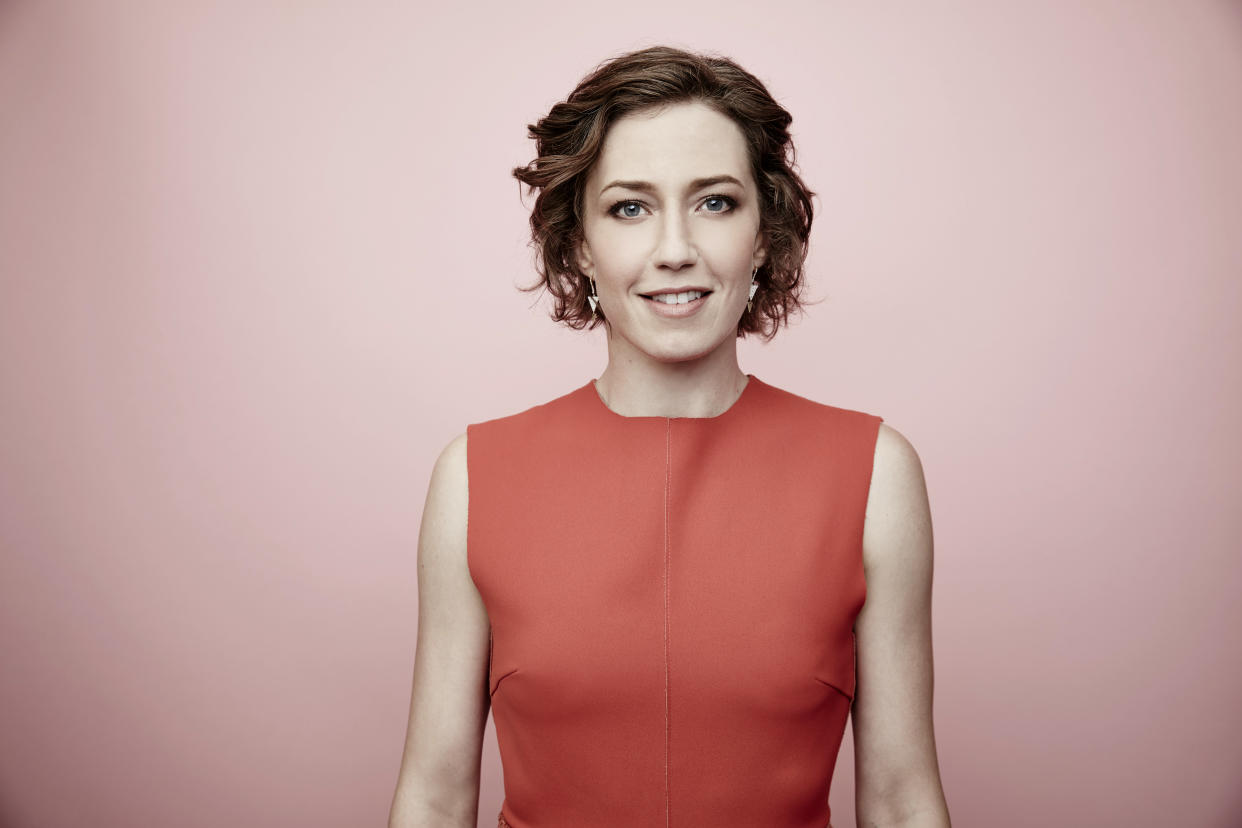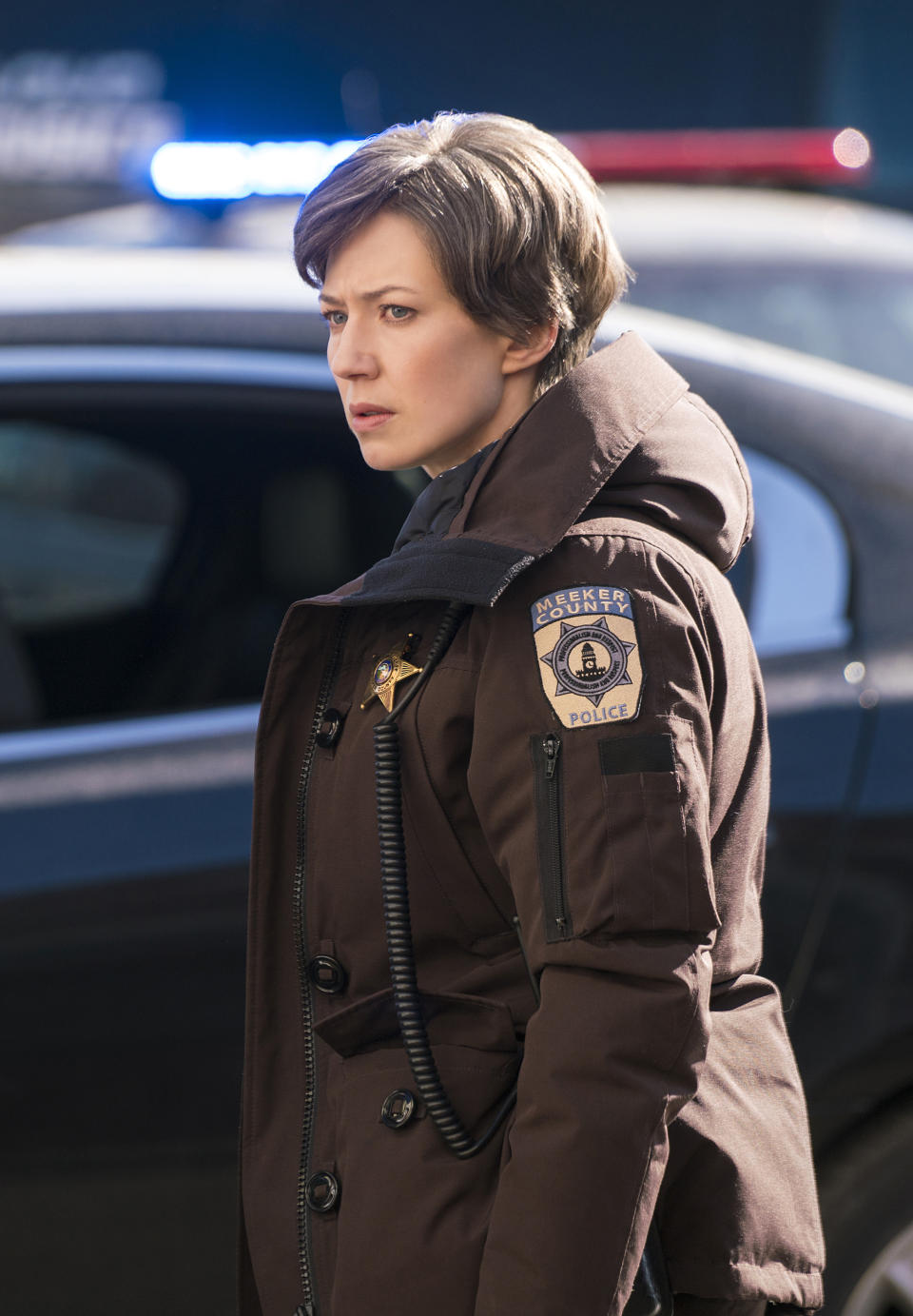Carrie Coon Talks 'Leftovers' Emmy Snub

Carrie Coon has had a hell of a year. In fact, she's had a hell of a five years, ever since she was cast in David Fincher's Gone Girl as the straight-talking sister to Ben Affleck's slippery Nice Guy. But her real breakthrough came the year before, when she starred in the 2012 Broadway revival of Who's Afraid of Virginia Woolf? If it weren't for that play, she says, "I would still be doing theater in Chicago very happily. My life just looks very different now.”
This year saw Coon turn in not one but two acclaimed small-screen performances. Her third and final year in HBO's The Leftovers solidified her grief-stricken Nora as one of the decade's most iconic TV characters, while her hardened cop Gloria brought a new kind of female strength to the third season of FX's Fargo.
Coon spoke with BAZAAR.com about subverting "Minnesota nice" in Fargo, that spellbinding final monologue in The Leftovers, and how she's processing the bittersweet feeling of being nominated for an Emmy for Fargo as The Leftovers was snubbed.
On working onstage and onscreen:
“I always feel that it's much easier to transition from the theater to TV and film, instead of the other way around. I find it's easier to scale down than to scale up and fill space. Who's Afraid of Virginia Woolf? changed my entire life: I met my husband [playwright and actor Tracy Letts] there, and it meant I was able to transition to a larger agency which opened up some opportunities in TV and film. Every casting director in New York saw it, even if the tourists didn’t, so it really opened all those doors for me."
"I'm always a little too naive about my circumstances to be as afraid as I probably ought to be.”
On how naivety has helped her:
“Gone Girl was my first movie ever, and I booked it off a tape in my living room in Chicago. When I went to meet David [Fincher] and audition for him, that was the first time I’d ever been to Los Angeles. I didn’t even have a smartphone, so I had to rent a GPS and they sent me driving around LA for a week taking meetings! I was terrified, of course, but I was actually a little too naive to be as scared as I should have been, probably. Which is sort of the theme of this whole transition in my life - I'm always a little too naive about my circumstances to be as afraid as I probably ought to be.”
On how she picks her roles:
“The statistic for actors is that if you book one out of 18 jobs, you’re doing really well. So oftentimes we don’t get to pick very much! But for me, it always comes down to the writing. My husband and I are real snobs - we’re big readers and my taste is decidedly literary, so if I find the storytelling unsatisfying, it's not something I'm usually interested in doing. I was familiar with Tom Perrotta’s book The Leftovers before it was adapted, and when you combine that with Damon Lindelof and HBO, of course I’m gonna throw my hat in the ring for that job!
“With Fargo, I was so skeptical about the original idea to turn that film into a series. It just seemed like a silly idea. And I was so struck by that first season, and thought the way Noah Hawley translated that milieu to TV was so smart. He’s written novels and he has a very strong sense of storytelling. I was so grateful that in the case of Fargo, it was one of those jobs that they asked me to do, because that's very rare for me, I still have to fight for most of the jobs that I get, so it was such a privilege to be asked, and I would have said yes without knowing anything about the script.”

On her Fargo character Gloria, and how she stands in contrast to the familiar “Minnesota nice” female cops like Frances McDormand’s iconic Marge Gunderson.
“Noah is adopting these tropes from the Coen brothers world, but he’s always playing with them. Gloria is the way she is because of the circumstances he's put her in; her personal life is absolutely disintegrating, and she just doesn't have the resources to muster 'Minnesota nice.' There was a time in her life when she would have been very adept at that, but this is not that time. He’s already put her in crisis when we meet her at the beginning of the series, and that just makes her very smart and playable. Noah gives us very active circumstances to deal with, and it’s really a gift as an actor to get that kind of information. With a bad script, you have to fill in a lot of blanks and make up those circumstances for yourself. In Fargo, the circumstances come to you so richly devised.”
On shouldering the final scene in both The Leftovers and Fargo:
“Even if you’re doing a monologue, you’re still doing a scene, and in The Leftovers it was so important that I was speaking to Justin Theroux, who is just a very present actor. It’s a great honor to be tasked with completing two shows in this way, and to me, because they’re so rich in language, they both almost felt like doing a play. You have to know that language cold, like you're gonna go out and perform it eight times a week.
"With Fargo, David Thewlis is one of those actors that I was intimidated by, which is very rare for me. I don’t feel intimidated very often, I feel like we’re all telling a story together and there's no reason to be scared of someone in a scene. But he’s such an extraordinary actor, so actually the danger for me in that scene was that I would get caught up watching him, instead of holding my ground. He’s word-perfect and so precise, and so truthful."
"If I find the storytelling unsatisfying, it's not something I'm usually interested in doing."
On the importance of ambiguity in both endings:
“What I sometimes find frustrating about TV and film is that it's actually very passive viewing. You don't have to engage with the material; you can get up and walk away and go get a snack while a TV show is on. In the theater, you're forced to reckon with physical presence in a space, and because Damon and Noah left those endings up to the viewer to decide what happens, it actually says more about the person watching than it does about the people doing the scene. It reveals to the viewer what they think, it forces them to consider what they believe. And I think life is ambiguous, frankly! We don’t get neat endings.”

On the disappointment of The Leftovers’ final season being snubbed by the Emmys:
“I feel that, as with shows like The Americans for example, we weren't on long enough for people to catch on. I’m encountering a lot of people out in the world who are just now binge-watching the show, after it’s all over. TV viewing has just changed so much, and there’s such incredible volume, it’s very difficult to break through. And when a show is challenging, as I believe ours is, I think it takes longer for word of mouth to spread. You could have picked any actor from our show and be justified in giving them a nomination, because the acting bench was very deep.
“Of course it was disappointing, but I can't say that I was surprised! We were hopeful, but I think also very realistic about the odds. I would have liked to see Justin get recognized for his incredibly honest work for three years, and Damon for his very brave and personal showrunning. And Mimi Leder, who’s a wonderful director; she directed our finale and her work is so tactile and visual. I’m always eager to see female directors singled out, and we just haven't caught up there.”
On working with Steven Spielberg’s The Papers, which has the most mind-bogglingly stacked cast of the year:
“It's pretty wild! It's an actor's dream: much like being on Broadway, working for Steven Spielberg is one of those bucket list items, and he's such a wonderful, generous, giddy creator. Likewise with Tom and Meryl, they both still love doing what they're doing after all this time, and that's very infectious and very obvious. The film is a real Who’s Who in TV and film right now - I think there are 130 speaking parts, something absurd like that. So I had the opportunity to brush up against all these wonderful actors, and everybody is equally kind, equally grateful to be there, and equally hard-working. So it was a really positive set, and a really positive experience. I just worked with some real titans, and it's kind of hard to wrap my head around, even, now that it's over. The story’s also very timely. In this world where journalism is under siege, it's very important to remember that the fifth estate is a critical part of our democracy, and that's why the story needs to be told right now.”
You Might Also Like

